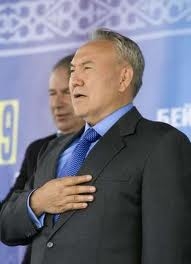Journalism and fear never go well together.
Just one day before I interviewed CBC foreign correspondent Nahlah Ayed, who has been covering the Middle East for over a decade, I learned that somebody tried to kill my colleague in Kazakhstan, journalist Lukpan Ahmediarov.
As I was interviewing Ayed, I couldn’t help but admire her courage. She is always packing her bags to report from a conflict-torn part of the world, leaving behind her safe and comfortable life in Canada. She said if you are not brave, just don’t go there. Her words echoed what once Ahmediarov told me: “if you are afraid of your own work – don’t be a journalist!”
Ahmediarov was shot three times and stabbed eight times from behind. Even though his vital organs remained intact, he is still in critical condition after a three-hour operation.
A week later, Ahmediarov was able to record an eight-minute video message to the public – a video that might cause his enemies to try to kill him yet again.
In the video, Ahmediarov says he has no doubts that his profession and civil activities are the main reasons somebody wanted to silence him. Moreover, he says, once stable, oil-rich country ruled by President Nursultan Nazarbayev for more than 20 years, are now torn by rifts which appeared as the president feverishly tried to hold onto his power.
With a bandaged head, Ahmediarov addressed many issues the country is facing, heavily criticizing the government. The correspondent says that by silencing journalists the government can’t hide its problems. It’s time for President Nazarbayev to step down, he says, and allow the country to have a proper democracy with a rotation of powers. “His [President Nazarbayev’s] project is exhausted,” says Ahmediarov.
But the journalist is more amazed at how the president is out of tune with his citizens’ mood. He says in 20 years, since the USSR collapsed, people have learned how to think critically. They can’t just read and believe self-censored, state-owned papers, nor do the citizens accept the messages conveyed by the presidentially-owned media.
Now, Ahmediarov says, people are realizing how absurd the regime has become.
By absurd the journalist means holding last year’s referendum to allow 72-year old President Nazarbayev to remain in power for life, and allowing the President’s supporters to erect monuments to him, claiming that it’s the peoples’ wish. It’s absurd, the journalist says, for the police without any investigation, to make a statement which claimed his attempted has nothing to do with politics or his profession.
“Kazakhstan has realized: That’s it! We can no longer live in such a country, and we must not live in such a country,” Ahmediarov declares. “It must be a normal country with a change of governments. That’s why people started talking – I was not the first.”
Indeed, Ahmediarov wasn’t the first citizen to raise concerns. In December 2011, the police opened fire on protesters in Zhanaozen, leaving 16 people dead, 100 injured. On the 20th anniversary of Kazakhstan’s independence from the former Soviet Union, laid-off oil workers stepped out onto the main street. The police claim that they shot protesters out of self-defense, while some witnesses say the striking workers were unarmed.
Meanwhile, Ahmediarov’s case left Uralsk and its citizens shaken. Uralsk is a city with a population of 350 000, situated on the northwestern border of Kazakhstan and Russia. Everybody in town knew the journalist had many enemies because of his bold articles and civil activities, but nobody had ever expected that somebody would attempt to kill him.
“I think in Uralsk, local powers got mad because in the battle with me they could not present anything adequate. I fought for my rights, for my freedom, for the rights of other Kazakhstanis. I never broke the law. Whatever I did, whether it was protesting on the streets or writing articles, I always told officials that I have a right to express my opinion.”
But not so, according to the Freedom House. In its 2012 charter on worldwide freedom of the press, Kazakhstan ranked 175th out of 196 countries, while Canada ranked 25th. For a democratic Kazakhstan with an embedded constitutional right to free speech and press, its status still remains “not free.”
Last year’s report on freedom of the press raised concerns about the country’s law that classifies libel as a criminal offence, with high penalties for the defamation of the president, members of the Parliament and state officials. In the first six months in 2010, there were 44 libel suits against journalists – the majority came from government officials. In 2009, for instance, Ramazan Yesergepov, the editor of the independent weekly Alma-Ata Info, was arrested in the hospital where was being treated for hypertension. Yesergepov was detained for eight months, and later, sentenced to three years in prison.
Tamara Eslyamova, editor-in-chief of the Uralsk Weekly, is familiar with every challenge that independent media face. Her newspaper is the only independent paper in Uralsk. It’s also the paper Lukpan Ahmediarov was writing for. Eslyamova says the government always pressures the print houses, distributors, sale outlets, denying them services. She and her journalists always receive angry calls and are harassed and threatened on the streets.
A botched contract-killer hit on Ahmediarov came to her as no surprise. In a telephone interview, Eslyamova said Ahmediarov had just written an article on how government officials are distributing multimillion-dollar projects to their families and relatives. Eslyamova says she knew after this article, officials wouldn’t go easy on the journalist, but the editor says Ahmediarov was always reporting such stories.
Why? Because he is not afraid to start a whirlwind or expose the truth.
More on the story:
Struggle for free press in Kazakhstan

